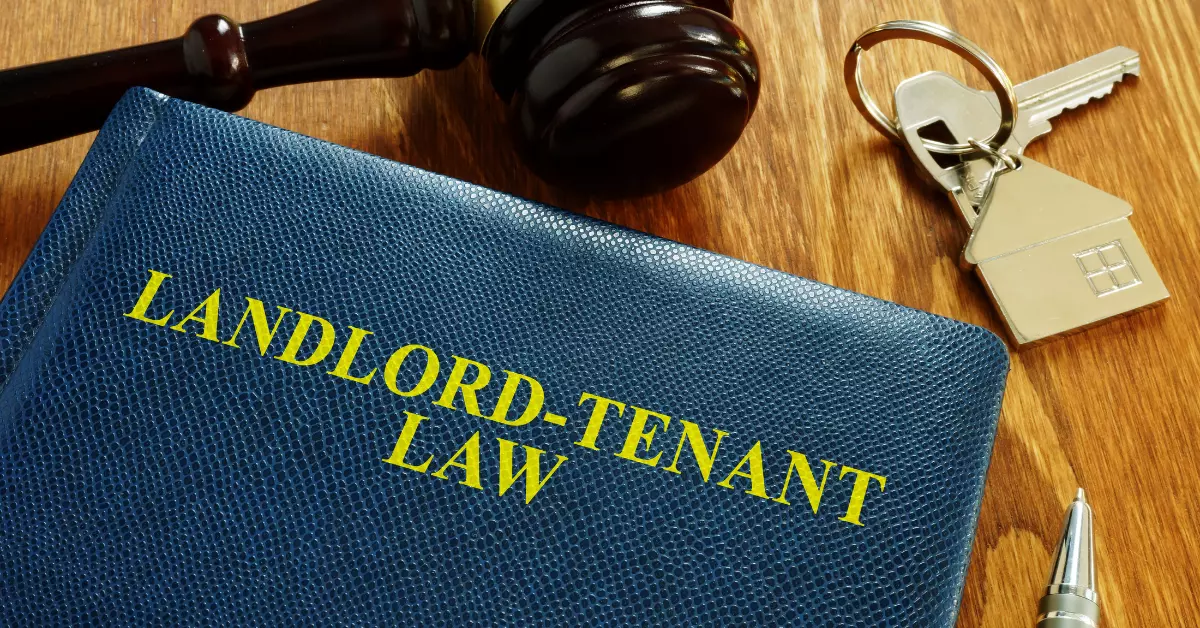When Does a Landlord Have to Pay for Moving Expenses?
Landlords are required to pay for moving expenses if they terminate a tenant’s lease without cause. In this case, the landlord must also provide written notice within a certain timeframe.
Failure to comply may result in legal consequences. The responsibility for paying for moving expenses can be a challenging issue for tenants and landlords.
The laws that govern these situations differ by state, so it is critical to know what is and is not allowed in each area.

Understanding The Basics Of Landlord Responsibilities
Definition Of A Landlord’s Responsibilities
To begin with, it’s important to understand what a landlord’s responsibilities are. Generally, a landlord is responsible for maintaining the property they rent out and keeping it in a livable condition.
Some of the specific responsibilities that most landlords have are:
Ensuring the safety of the rental property
This includes making sure that the property is structurally sound and that any appliances or facilities provided by the landlord are safe and in good working order.
Performing any repairs or maintenance
If something goes wrong with the property, the landlord is usually responsible for fixing the problem. This can range from minor repairs like fixing leaking faucets to major projects like replacing a roof.
Providing utilities
Most landlords are responsible for providing basic utilities like water and electricity to their tenants.
Maintaining common areas
If a rental property has shared common areas like hallways or laundry rooms, the landlord is responsible for maintaining these spaces.
Understanding The Tenancy/Landlord Laws And Regulations
As a landlord, it’s important to understand the laws and regulations that govern your actions. These laws vary by state and country, so it’s important to check with local authorities for specifics.
However, there are some general principles that apply to most regions.
Here are a few things to keep in mind:

Fair housing laws
Landlords are not allowed to discriminate against tenants based on their race, gender, religion, sexual orientation, or other factors. Be sure to adhere to these laws to avoid legal repercussions.
Required disclosures
Depending on where you live, there may be certain disclosures you are required to make as a landlord.
For example, you may need to provide tenants with information about lead paint hazards or inform them of any recent bedbug infestations.
Tenant rights
Tenants have certain rights that landlords must respect. For example, tenants have the right to a certain amount of privacy and landlords cannot enter their rental unit without permission or notice.
Security deposits
There are laws governing how much landlords can charge for security deposits and how they must handle these deposits. Make sure to follow these laws to avoid legal issues.
Importance Of Adhering To The Legal Obligations
Adhering to your legal obligations as a landlord is incredibly important, both from a moral and a legal standpoint.
Failing to follow the laws and regulations that govern your actions can have serious consequences, such as fines, legal penalties, and even lawsuits from tenants.
Additionally, following these laws can help you maintain positive relationships with your tenants and ensure that they feel safe and secure in their homes.
When Does A Landlord Have To Pay For Moving Expenses?
Moving homes can be a stressful experience, and tenants may incur substantial costs that they may not necessarily have prepared for.
However, depending on the situation, landlords may be legally obligated to bear some of the moving expenses. We shall discuss when a landlord has to pay for moving expenses.

Circumstances In Which Landlords Have To Pay For Moving Expenses
Here are some scenarios in which landlords may have to pay for their tenants’ moving expenses:
Relocation
If a tenant is required to move out of a rental property because the landlord has decided to renovate, demolish, or convert the property, the landlord may have to pay for the moving expenses.
Uninhabitable property
If a rental property becomes uninhabitable due to circumstances beyond control, like a natural disaster, the landlord may be obligated to pay for the tenant’s moving expenses.
Lease agreement
Landlords may choose to sign lease agreements with their tenants that state the circumstances under which the landlord is obligated to pay for moving expenses.
Local law
Some cities and states have their own laws and regulations regarding when landlords have to pay for the tenant’s moving expenses.
Explaining The Legal Obligations Of The Landlord
Although a landlord may not always be obligated to pay for moving expenses, they do have some legal obligations when it comes to tenant relocation. For instance:
Providing notice
If a landlord intends to terminate a tenancy that requires a tenant to move out of a rental unit, the landlord must provide the tenant with adequate notice to allow them to find a new place to live.
Careful planning
If a landlord is relocating a tenant in a different rental unit, they must ensure that the move does not unreasonably interfere with the tenant’s enjoyment of the leased premises. This may involve careful planning and coordination with the tenant.
Fairness
Landlords must always act in good faith and with a reasonable manner towards their tenants.
Scenarios In Which The Landlord Is Not Obligated To Pay For Moving Expenses
Here are some situations in which landlords are typically not obligated to pay for the tenant’s moving expenses:
- When a tenant decides to move voluntarily before their lease term expires.
- If the tenant has breached the terms of their lease agreement.
- If the tenant is being evicted for reasons specified in the lease, such as non-payment of rent or causing damage to the property.
What Are The Consequences Of Not Paying Moving Expenses?
When a lease agreement ends, landlords may be required to pay their tenants for moving expenses. As a landlord, it is vital to understand when this payment is mandatory and the consequences of failing to meet this obligation.
Let’s explore when landlords have to pay for moving expenses and the impact of not doing so under the following subheading.
Penalties For Not Paying Moving Expenses
If a landlord fails to pay for their tenant’s moving expenses as per the lease agreement, they may face penalties. These penalties may include:
- Fines and charges imposed by the state or local government.
- An order from the court demanding the payment of the expenses.
- Damages, which may be significant in cost, awarded for failing to uphold their legal obligations.
Explanation Of Legal Action Tenants Can Take
When a landlord fails to pay for their tenant’s moving expenses, they are not only breaching the lease agreement but also the law. As a result, tenants may take the following legal actions:
- Filing a complaint with the state or local housing agency.
- Filing a lawsuit against the landlord for breach of contract.
- Withholding rent until the payment of the expenses is made.
Impact On The Landlord-Tenant Relationship
Failure to pay for a tenant’s moving expenses can have a significant impact on the landlord-tenant relationship. Landlords may experience the following:
- A negative reputation in the eyes of the tenants, which may result in difficulty in finding future tenants.
- Tarnished credentials, as tenants may share their experience with other potential tenants or even on social media.
- A prolonged legal battle, which can lead to litigation costs and, ultimately, loss of time and resources.
Paying for tenants’ moving expenses may seem like a daunting task for landlords, but it is a legal obligation.
Failing to do so can result in severe consequences, including penalties and legal action, which can have a lasting impact on the landlord-tenant relationship and the landlord’s reputation.
As a landlord, it is essential to know and uphold your obligations to avoid such consequences.
Key Considerations For Tenants
Moving is an expensive and exhausting process. For tenants, particularly those who are under tight budgets, it is important to understand when landlords are required to cover the moving expenses.
Although it’s not always the case, some tenants are eligible for that compensation. If you’re a tenant, here are some key considerations to keep in mind before signing a lease.

Factors To Consider Before Signing A Lease
Before making any final decisions, tenants should consider various factors that could potentially affect their ability to get compensation for moving expenses. Some of these factors include:
- The specific state laws that outline a landlord’s responsibilities.
- The date of the lease – whether it was signed before or after a law was enacted or amended.
- The terms of the lease itself (whether they include a moving clause and the scope of the landlord’s responsibilities, if any).
- The amount of notice given to the landlord before the termination of the lease.
Negotiating With Landlords
Tenants can try negotiating with their landlords, especially if they feel that they have a strong case for compensation.
In some instances, landlords might agree to cover all or part of the moving expenses. For this to happen, tenants need to:
- Provide clear reasons and evidence for their claims.
- Be courteous and flexible in their communication.
- Come up with a detailed moving budget that their landlord can review.
- Be prepared to make some concessions or to accept a counteroffer.
Budgeting For Moving Expenses
Finally, tenants should budget for moving expenses as part of their overall financial plan. Regardless of whether the landlord is required to cover the costs or not, tenants should prepare for both expected and unexpected expenses.
Here are some costs they may need to budget for:
- Hiring a moving company or renting a moving truck.
- Packing materials such as boxes, tape, and bubble wrap.
- Cleaning services for their current and new homes.
- Deposits for utilities and other services.
- Storage expenses if there is a time delay between moving out and moving in.
How To Navigate Moving Costs As A Tenant

Guidelines For Estimating The Total Cost Of Moving Expenses
Moving to a new apartment involves a series of costs that can add up quickly. Here are some guidelines for estimating the total cost of moving expenses:
- Moving supplies: Boxes, bubble wrap, tape, and packing paper can all add up. Make an inventory and estimate how many you will need.
- Moving truck or van: Compare prices, taking distance into consideration.
- Cleaning costs: You may need to hire a cleaning company to leave your old place spotless, or be ready to spend your own time cleaning.
- Utility fees: Don’t forget to switch over utility fees from your old place to the new one.
- Time and effort: Consider the time and effort it will take to pack, move, and unpack, along with any possible work days missed.
Sources Of Financial Support For Low-Income Individuals
Moving expenses are an extra burden for low-income individuals. Here are some sources of financial support that can help ease the financial pressure:
- Government assistance programs: Some government assistance programs offer benefits and services to help with moving costs.
- Charitable organizations: Some charitable organizations provide financial assistance to individuals facing financial hardship.
- Low-income housing programs: Various low-income housing programs may provide assistance with moving expenses to individuals who qualify.
How To Reduce Moving Costs
The following tips can help you reduce moving costs and make the move more affordable:
- Declutter: Moving is a great opportunity to declutter and streamline your belongings. Consider selling or donating items you no longer need.
- Plan ahead: Plan your move several weeks in advance so you have time to research affordable moving options.
- Pack efficiently: Pack your belongings in a way that maximizes space and minimizes the number of boxes you need.
- Ask for help: Enlist the help of friends and family to cut down on moving costs.
- Negotiate: Don’t be afraid to negotiate with the moving company for a better price or to request discounts.
Tenants Rights Regarding Moving Expenses
Legal Rights Related To Moving Expenses
Tenants have certain legal rights related to moving expenses which they can claim from their landlord under specific circumstances. These may include:
A written agreement
Tenants have a legal right to a written agreement clearly stating who is responsible for moving expenses. Landlords must provide this agreement in writing before signing the lease.
Security deposit
If the landlord is responsible for paying moving expenses and does not pay, tenants can use their security deposit to cover the expenses.
Understanding Tenant-Landlord Agreements
Before signing a lease, tenants should always understand the tenant-landlord agreement regarding moving expenses.
They should ask the landlord about any moving expense policies or agreements in place and clarify any doubts.
Here are some key points tenants should keep in mind:
- Read the lease carefully: The lease agreement should clearly state who is responsible for paying moving expenses.
- Ask questions: If there is any ambiguity or confusion, ask the landlord to clarify it before signing the lease.
- Get it in writing: Any agreement regarding moving expenses should be in writing with both tenant and landlord signatures.

Addressing And Resolving Disputes Related To Moving Expenses
In some cases, tenants and landlords may have disputes related to moving expenses. Here are some steps tenants can take to resolve these disputes:
Negotiate
Tenants can try to negotiate with their landlord and come to a mutual agreement regarding moving expenses.
Know your rights
If the landlord is responsible for paying moving expenses and does not fulfill this obligation, tenants can take legal action against them.
Document everything
Tenants should keep a record of all moving expenses and any communication with the landlord regarding the expenses. This can be used as evidence in case of a dispute.
Seek legal help
If the situation escalates and tenants need legal assistance, they can contact a housing lawyer or their local tenants’ rights organization.
FAQs for When Does a Landlord Have to Pay for Moving Expenses?
What Are The Situations Where A Landlord Has To Pay For A Tenant’S Moving Expenses?
Landlords are required to pay for a tenant’s moving expenses when they are conducting a no-fault eviction or if the tenant leaves a rental unit due to the landlord’s breach of the lease agreement.
Can A Landlord And Tenant Come To An Agreement Where The Landlord Pays For Moving Expenses Voluntarily?
Yes, landlords and tenants can come to an agreement where the landlord voluntarily pays for the tenant’s moving expenses, but it won’t be a legal requirement unless specific circumstances are met.
Are There Any Limitations On The Amount A Landlord Can Be Required To Pay For Moving Expenses?
There are no specific limits on the amount a landlord can be required to pay for moving expenses in most states. Landlords will usually be required to pay for reasonable expenses such as rental trucks, moving crews or even hotel stays if necessary.
What Should Tenants Do If Their Landlord Refuses To Pay For Their Moving Expenses When Required To Do So By Law?
Tenants have several options if their landlord refuses to pay for their moving expenses when legally required to do so. They can take legal action or file a complaint with their local housing authority or tenant association. It is important to seek legal advice before taking any action.
Conclusion
Navigating the world of landlord obligations isn’t always clear cut. However, your landlord could be responsible for moving expenses if your rental unit is uninhabitable, or if eviction occurs through no fault of your own.
Always remember to know your rights and communicate effectively to protect your interests.
Reference
https://dcba.lacounty.gov/wp-content/uploads/2021/03/Relocation-Assistance-FAQ.pdf